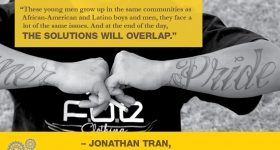Photo by Richard Messenger. Retrieved from Flickr.
Through the Philippine government’s worldwide labor-brokering, Overseas Filipino Workers (OFWs) comprise over 10 million workers around the globe. In Israel, OFWs represent the largest group of immigrants. They are primarily women (the female:male ratio is 6:1 in Israel), an imbalance that is unsurprising given the gendered nature of their work. Filipinas are the go-to source of caregiving for Israel’s elderly and those with disabilities, centered primarily in Tel Aviv, Jerusalem, and Haifa. In addition, approximately 200 Filipinas, married to Palestinians, reside in the West Bank and Gaza.
With a domestic economy misshapen by decades of dictatorship and corruption, preceded by 400 years of occupation, caregiving is one of few ways Filipinas can provide for their own. They are marketed by their government, which hails OFWs as national heroes -- touting them as productive and docile women workers, as Filipina American scholar Anna Gueverra has noted. With a record high $25.1 billion in remittances last year, OFW labor created 10% of the country’s gross domestic product.
A confluence of colonial history, neo-liberal policies, and the failure on the part of many governments to provide adequate and dignified care for the aging has created the OFW caregiver. But like many immigrants, Filipinas often navigate their position with resilience and ingenuity -- building communities of mutual support abroad and tending to loved ones from a distance, while moving through a guantlet of barriers to eventually improve their situation.
Yet everywhere OFWs migrate -- Hong Kong, Singapore, the Middle East, parts of Europe, Canada, and America -- they migrate without rights. Paying thousands for the barest of contracts, many keep working after contract expiration to keep earning. Even with contracts, OFWs are hyper-exploited. They are underpaid, toil long hours with expanding responsibilities and no benefits, and are vulnerable to wage theft and abuse.
Today Palestinians deprived of both home and human rights are enduring massacre at the hands of a colonial host government. Amidst these attacks, the Philippine connection in Israel may seem of little importance. But the 36,000 OFWs in Israel -- also a diasporic people -- share one aspiration with their fellow OFWs around the world, 10.5 million strong: a desire for equal rights. Their experience is one of few rights; workers who call their Israeli employers “masters” remit the bulk of their earnings home. In the words of photo-journalist Medi Nahmiyaz, “They live segregated in the poor and old part of Tel Aviv where most Israelis almost never enter.”
The challenges faced by OFWs worldwide are even more dehumanizing in Israel. Zionism means a lack of rights for all non-Jewish immigrants. It also means that Palestinians who lived on the land before the state existed are forced to live under bombardment, siege, and occupation, while Jewish people from anywhere have immediate citizenship. It is a state in which, as Jewish anti-Zionists Max Blumenthal and Philip Weiss note, "racism is rampant..but conditions of naked apartheid are denied, heighten[ing] the danger of violence to everyone…to the point that out-and-out racists have become ministers in the Israeli government."
One such politician is Interior Minister Eli Yishai, who asserted migrant children in particular would “damage the state’s Jewish identity, constitute a demographic threat and increase the danger of assimilation.” As journalist Mya Guarnieri has reported, Israel’s deportation strategy is focused on children. Long before stories broke of the United States deporting thousands of child refugees, and of Israel’s callous treatment of Sudanese and Eritrean survivors of war seeking asylum, the Jewish state was engaged in the systematic deportation of Israeli-born Filipino children and their parents.
While a small number of Israeli-born OFW teenagers were granted permanent residency by the government under much pressure in 2006, their naturalization -- a one-time only measure -- turned out to be a deal with strings. The qualifying child would become a permanent resident, but only temporary residency would be granted to their parents and siblings until the child’s completion of service in the Israeli Defense Forces (IDF). It was a deal reminiscent of the deal offered to Filipinos who served with the U.S. Armed Forces in World War II. Survivors of the war -- many of them survivors of the Bataan Death March -- saw that promise of citizenship revoked, and were unable to even receive veterans’ benefits.
Israel shares with all capitalist countries an aim to have it both ways with migrant populations: they represent desirable yet disposable workers. What separates Israel from all other capitalist countries is Zionism, which maintains unequal rights for the non-Jewish while simultaneously demanding unearned loyalty and indoctrination. Reading recent news, we see this tension playing out. The Philippine Daily Inquirer reported on Israel’s “help” to the Filipinas of Gaza after bombing them, quoting only the Israeli Ambassador. Another site, The Rappler, discussed the need for repatriation amidst casualties, with the sole accompanying human image that of a Jewish family in mourning. Then there was the outrageous rally of Filipinos in Tel Aviv to voice support for Israel. But perhaps most alarming is the possibility of a generation of quietly indoctrinated Filipino Israeli non-citizens, such as one teen girl who lamented that a lack of citizenship means she cannot join her friends in the IDF.
There is a clear moral imperative, illustrated in casualties -- especially those of children -- from bombs raining on an imprisoned population. The massacre unfolding is a fact of occupation, which Filipinos should recognize from our own history. It is a history of resistance and war from which we are still reeling as we travel the world with English-speaking tongues, trying to escape the poverty of a resource-rich country that was, for a brief moment between occupations, the first democracy in Asia.
It is a time for challenging talks, with our Titas, our loved ones, and our friends. Time to talk of applying for contracts elsewhere. Of supporting OFWs in calling for rights they must be granted, from recipient countries of their labor, through which they are the engine of so much wealth. It is time to speak up against Israel’s attacks on Palestine and its undignified treatment of migrant workers. It is time to consider the call of Boycott, Divestment, Sanctions, the strategy led by Palestinians aiming to transform the Zionist state into one of equal rights for all.
***
Sarah Macaraeg is a Filipina-American writer and activist based in Chicago, where she is at work on a book of oral histories of low-wage women workers, including many caregivers, across the city (Haymarket Books 2016). She is the proud niece of two caregiver Titas, serves on the junior board of the disability rights organization Access Living, and is a co-chair of the Chicago chapter of the National Asian Pacific American Women’s Forum (NAPAWF). She is on Twitter at @seramak.









Comments